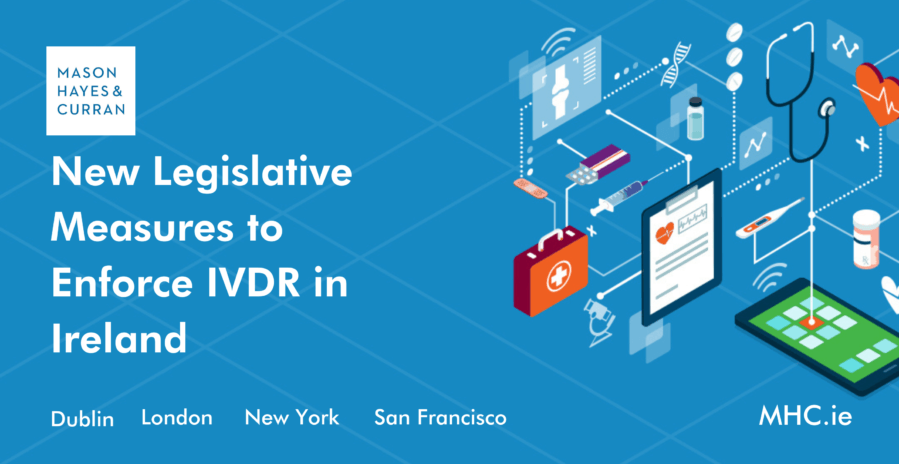
EU Regulation 2017/746 on in vitro diagnostic medical devices (IVDR) came into force across the EU in late May 2022. Previous articles produced by our team provide a comprehensive overview of the changes introduced by the IVDR and the applicable IVDR transitional provisions.
As an EU Regulation, the IVDR has direct effect in all EU Member States. However, some aspects still require implementation at a national level, such as enforcement provisions and establishment of national regulatory bodies. Accordingly, on the same day that the IVDR came into force across the EU, the Irish Government enacted two regulations to further implement the IVDR:
- S.I. 256 of 2022 - In Vitro Diagnostic Regulations (Irish IVDR Regulations 2022). These regulations revoke the previous Irish regulations implementing the IVDR’s predecessor, Directive 98/79/EEC on in-vitro diagnostic medical devices (IVDD).
- S.I. 257 of 2022 - EU (National Research Ethics Committees for Performance Studies of In Vitro Diagnostic Medical Devices Regulations 2022 (Irish IVDR National Office Regulations).
These Regulations create offences for non-compliance with the IVDR and formalise rules around the conduct of ‘Performance Studies’. They also establish a national body tasked with upholding ethical standards in the conduct of performance studies required under the IVDR, called the National Office for National Research Ethics Committees for Performance Studies of In Vitro Diagnostic Medical Devices (National Office).
With the IVDR coming into force and an expanded range of offences that can now be prosecuted, the role of the Health Products Regulatory Authority (HPRA) has expanded significantly. It has been conferred with additional functions for the regulation of in vitro diagnostic medical devices (IVDs). The HPRA is now designated as the market surveillance authority in Ireland for IVDs for the purposes of the Accreditation and Market Surveillance Regulation (EC/765/2008) and the Market Surveillance Regulation (EU/2019/1020). It has also committed to work with the European Commission and the Department of Health “to ensure that the IVDR is implemented effectively and that the legal, resource and system requirements are all put in place at national level”.
Offences for breaches of the IVDR
The Irish IVDR Regulations 2022 establish a range of offences for economic operators, defined by the IVDR as a manufacturer, an authorised representative, an importer or a distributor, who fail to comply with the IVDR. These offences include:
- Manufacturers are most heavily impacted with 39 offences specified. Although not all of the offences are new, the increased specificity of the offences reflects the complexity of the IVDR. Unsurprisingly, quality and safety considerations are predominant features across the offences. To ensure ongoing safety, a key objective of the IVDR, it is now an offence for manufacturers to fail to fulfil their post-market surveillance obligations. Failing to conduct performance studies - a means of evaluating performance - as prescribed by the IVDR, is also now an offence.
- Authorised Representatives, distributors and importers may also be held criminally liable for failing to uphold their obligations under the IVDR.
- A range of offences are also stipulated to apply generally to persons engaged in prescribed unlawful conduct. This conduct includes making available or putting into service a device that fails to comply with a general safety and performance requirement under Annex I of the IVDR. It also includes the use of misleading content in the labelling, instructions for use, making available, putting into service or advertising of a device. Other general offences set out in the Regulations include prohibiting distance selling of non-compliant devices by information society services to persons established in a member state.[1] Non-compliant economic operators engaged in distance selling of IVDs face penalties and may be ordered to cease operations altogether.
- Notified Bodies must uphold their documentary and notification obligations to the HPRA or risk prosecution.
- The “sponsor”[2] of a performance study is also subject to a range of offences arising from a failure to comply with their obligations under the IVDR. These offences include those related to the design, authorisation, conduct, recording and reporting of the study.
Enforcement powers
The HPRA is given new powers of enforcement under the Irish IVDR Regulations 2022. For example, an authorised officer of the HPRA can enter premises, potentially accompanied by a member of the Irish police force, An Garda Síochána, if they have reasonable grounds to believe a business or activity connected with “any relevant thing or relevant service” is non-compliant with the IVDR. Evidence may be seized and retained for testing and for use as evidence in any proceedings. The HPRA may also issue Compliance Notices or Prohibition Orders directing or prohibiting certain corrective actions to mandate compliance with the IVDR. Enforcement proceedings may follow if such notices are not complied with in a satisfactory manner.
Unlike the previous Irish regulations implementing the IVDD,[3] the new Irish IVDR Regulations do not set out the specific penalties that apply for offences under those Regulations. Instead, the penalties for failure to comply with the Irish IVDR Regulations are now found under section 32 of the Irish Medicines Board Act 1995 (as amended). The application of these penalties depends on whether the offence is prosecuted on a summary or indictable basis. A person found guilty of an offence will be liable on summary conviction to a fine not exceeding €2,000, or a term of imprisonment not exceeding one year, or both. A person found guilty of an offence will be liable on conviction on indictment in the case of a first offence to a fine not exceeding €120,000 or a term of imprisonment not exceeding 10 years or both. In the instance of a subsequent offence, a person found guilty may face a fine not exceeding €300,000 or a term of imprisonment not exceeding 10 years, or both.
Performance studies
Both Regulations also further implement provisions in the IVDR relating to performance studies.
The IVDR requires that device manufacturers periodically test the performance of their devices. Because IVDs are used to test human samples, the IVDR seeks to strictly limit the negative impact of performance testing to protect the “rights, safety, dignity and well-being” of human subjects. The IVDR requires all performance studies be subject to scientific and ethical review.
The Irish IVDR National Office Regulations have the sole objective of setting up the newly designated National Office and separately, National Research Ethics Committees (referred to under the Regulations as ‘National RECs’). The National RECs will have responsibilities for conducting ethical reviews of performance studies under the IVDR. It should be borne in mind, however, that prior to seeking ethical approval, those undertaking performance studies must first obtain authorisation from the HPRA.
More than one National REC can be established under the legislation to perform ethical reviews and provide opinions on performance studies under the IVDR. A National REC will review the risks and benefits of a study, consider financial undue influence, the arrangements for recruitment of and the privacy protections afforded to study subjects. Performance studies must have an appropriate policy of insurance in place. The committee deciding on an application may provide a favourable opinion, a favourable opinion subject to conditions, or reject the proposal outright.
The Irish IVDR National Office Regulations also prescribe a range of offences relating to performance studies including, conducting an IVD study contrary to a refusal, modifying a study without re-applying for ethical approval, conducting a study without insurance, knowingly making a false statement to a National REC, or claiming a study has been approved when it has not.
The penalties for these offences are set out in the Irish IVDR National Office Regulations themselves. A person who commits an offence is liable on summary conviction to a Class B fine (up to €4,000), up to six months in prison, or both and upon conviction on indictment, to a fine of up to €300,000, up to three years in prison, or both.
Conclusion
Both of the new Irish Regulations give further effect under Irish law to key features of the IVDR. Enforcement powers are far-reaching, especially those granted to the HPRA, whose oversight function has been broadened significantly.
Accordingly, IVD manufacturers, authorised representatives, importers, distributors and those involved in distance selling of IVDs, should familiarise themselves with the new Regulations to ensure compliance and avoid risk of prosecution.
[1] As defined in Article 1(1)(b) of Directive (EU) 2015/1535 as “any service normally provided for remuneration, at a distance, by electronic means and at the individual request of a recipient of services.”
[2] Article 2(57) IVDR (EU) 2017/746
[3] S.I. 304/2001, European Communities (In-vitro Diagnostic Medical Devices) Regulations, 2001
For more information, please contact a member of our Life Sciences and Product Regulatory team.
The content of this article is provided for information purposes only and does not constitute legal or other advice.





